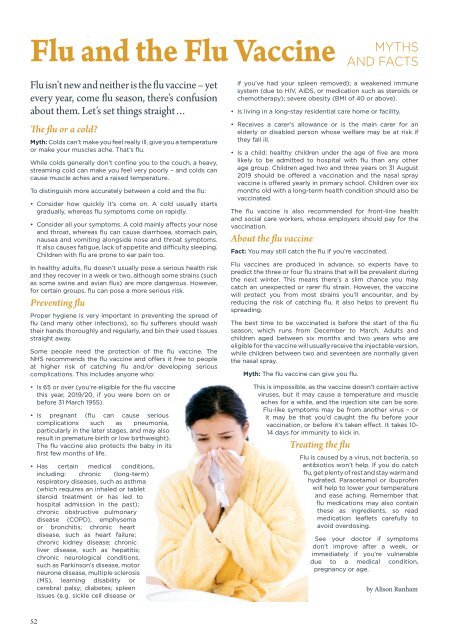I and A Mag Oct19
Telford Magazine
Telford Magazine
You also want an ePaper? Increase the reach of your titles
YUMPU automatically turns print PDFs into web optimized ePapers that Google loves.
Flu <strong>and</strong> the Flu Vaccine<br />
MYTHS<br />
AND FACTS<br />
Flu isn’t new <strong>and</strong> neither is the flu vaccine – yet<br />
every year, come flu season, there’s confusion<br />
about them. Let’s set things straight…<br />
The flu or a cold?<br />
Myth: Colds can’t make you feel really ill, give you a temperature<br />
or make your muscles ache. That’s flu.<br />
While colds generally don’t confine you to the couch, a heavy,<br />
streaming cold can make you feel very poorly – <strong>and</strong> colds can<br />
cause muscle aches <strong>and</strong> a raised temperature.<br />
To distinguish more accurately between a cold <strong>and</strong> the flu:<br />
• Consider how quickly it’s come on. A cold usually starts<br />
gradually, whereas flu symptoms come on rapidly.<br />
• Consider all your symptoms. A cold mainly affects your nose<br />
<strong>and</strong> throat, whereas flu can cause diarrhoea, stomach pain,<br />
nausea <strong>and</strong> vomiting alongside nose <strong>and</strong> throat symptoms.<br />
It also causes fatigue, lack of appetite <strong>and</strong> difficulty sleeping.<br />
Children with flu are prone to ear pain too.<br />
In healthy adults, flu doesn’t usually pose a serious health risk<br />
<strong>and</strong> they recover in a week or two, although some strains (such<br />
as some swine <strong>and</strong> avian flus) are more dangerous. However,<br />
for certain groups, flu can pose a more serious risk.<br />
Preventing flu<br />
Proper hygiene is very important in preventing the spread of<br />
flu (<strong>and</strong> many other infections), so flu sufferers should wash<br />
their h<strong>and</strong>s thoroughly <strong>and</strong> regularly, <strong>and</strong> bin their used tissues<br />
straight away.<br />
Some people need the protection of the flu vaccine. The<br />
NHS recommends the flu vaccine <strong>and</strong> offers it free to people<br />
at higher risk of catching flu <strong>and</strong>/or developing serious<br />
complications. This includes anyone who:<br />
• Is 65 or over (you’re eligible for the flu vaccine<br />
this year, 2019/20, if you were born on or<br />
before 31 March 1955).<br />
• Is pregnant (flu can cause serious<br />
complications such as pneumonia,<br />
particularly in the later stages, <strong>and</strong> may also<br />
result in premature birth or low birthweight).<br />
The flu vaccine also protects the baby in its<br />
first few months of life.<br />
• Has certain medical conditions,<br />
including: chronic (long-term)<br />
respiratory diseases, such as asthma<br />
(which requires an inhaled or tablet<br />
steroid treatment or has led to<br />
hospital admission in the past);<br />
chronic obstructive pulmonary<br />
disease (COPD), emphysema<br />
or bronchitis; chronic heart<br />
disease, such as heart failure;<br />
chronic kidney disease; chronic<br />
liver disease, such as hepatitis;<br />
chronic neurological conditions,<br />
such as Parkinson’s disease, motor<br />
neurone disease, multiple sclerosis<br />
(MS), learning disability or<br />
cerebral palsy; diabetes; spleen<br />
issues (e.g. sickle cell disease or<br />
if you’ve had your spleen removed); a weakened immune<br />
system (due to HIV, AIDS, or medication such as steroids or<br />
chemotherapy); severe obesity (BMI of 40 or above).<br />
• Is living in a long-stay residential care home or facility.<br />
• Receives a carer’s allowance or is the main carer for an<br />
elderly or disabled person whose welfare may be at risk if<br />
they fall ill.<br />
• Is a child: healthy children under the age of five are more<br />
likely to be admitted to hospital with flu than any other<br />
age group. Children aged two <strong>and</strong> three years on 31 August<br />
2019 should be offered a vaccination <strong>and</strong> the nasal spray<br />
vaccine is offered yearly in primary school. Children over six<br />
months old with a long-term health condition should also be<br />
vaccinated.<br />
The flu vaccine is also recommended for front-line health<br />
<strong>and</strong> social care workers, whose employers should pay for the<br />
vaccination.<br />
About the flu vaccine<br />
Fact: You may still catch the flu if you’re vaccinated.<br />
Flu vaccines are produced in advance, so experts have to<br />
predict the three or four flu strains that will be prevalent during<br />
the next winter. This means there’s a slim chance you may<br />
catch an unexpected or rarer flu strain. However, the vaccine<br />
will protect you from most strains you’ll encounter, <strong>and</strong> by<br />
reducing the risk of catching flu, it also helps to prevent flu<br />
spreading.<br />
The best time to be vaccinated is before the start of the flu<br />
season, which runs from December to March. Adults <strong>and</strong><br />
children aged between six months <strong>and</strong> two years who are<br />
eligible for the vaccine will usually receive the injectable version,<br />
while children between two <strong>and</strong> seventeen are normally given<br />
the nasal spray.<br />
Myth: The flu vaccine can give you flu.<br />
This is impossible, as the vaccine doesn’t contain active<br />
viruses, but it may cause a temperature <strong>and</strong> muscle<br />
aches for a while, <strong>and</strong> the injection site can be sore.<br />
Flu-like symptoms may be from another virus – or<br />
it may be that you’d caught the flu before your<br />
vaccination, or before it’s taken effect. It takes 10-<br />
14 days for immunity to kick in.<br />
Treating the flu<br />
Flu is caused by a virus, not bacteria, so<br />
antibiotics won’t help. If you do catch<br />
flu, get plenty of rest <strong>and</strong> stay warm <strong>and</strong><br />
hydrated. Paracetamol or ibuprofen<br />
will help to lower your temperature<br />
<strong>and</strong> ease aching. Remember that<br />
flu medications may also contain<br />
these as ingredients, so read<br />
medication leaflets carefully to<br />
avoid overdosing.<br />
See your doctor if symptoms<br />
don’t improve after a week, or<br />
immediately if you’re vulnerable<br />
due to a medical condition,<br />
pregnancy or age.<br />
by Alison Runham<br />
52










